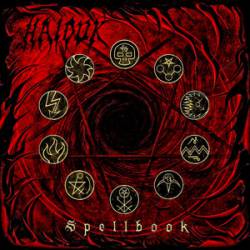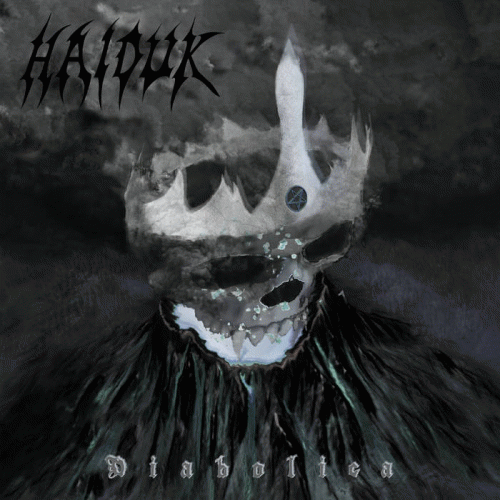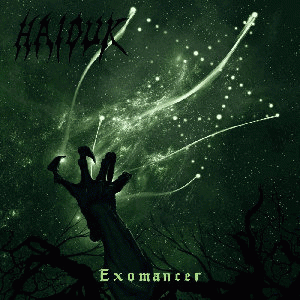We have here an album in the vein of
Morbid Angel,
Hellwitch and other eighties thrash/speed/death metal bands, except for the lack of guitar solos. It is one-man Canadian band
Haiduk’s debut album, titled
Spellbook. There is a compelling robotic, scalpel-like precision to the way the full-throttle guitar riffs are played, probably due in part to the fact that the drummer of
Haiduk is a machine. Literally.
The songs are all fairly short, going for brevity to kick your ass with a ton of riff alterations and a strong forward drive. The only structure here is in the guitars. The lyrics to each song are roared straight through, not repeating themselves, allowing the guitars to build on themselves by refraining the wild hook riffs and pushing into the next lead. In this way the songs have a very instrumental quality. Before the vocals come in and after they fade off, their presence is forgotten in favour of what the guitars are doing. The production on the guitars is full-bodied but sharp, making up for the absence of a bass player. The fact that their only constant competition is a machine drum makes the guitars stand out as the only real genuine charm of the album. With a lot of strong riffs to fill up each song and a feeling of tension used pretty well in places (such as in the song Tremor, for example), there is a lot to be enjoyed on a technical level.
That wild, vortex-like feeling of being trapped in a firestorm that was so infamous in
Morbid Angel’s
Altars of Madness is present here.
And amidst all of the action and shredding, the riffs are still allowed to switch and flow naturally from one to the next. The fierceness and relentlessness of the album should appeal to a lot of people, and the bizarre tone of some of the riffs, such as the introduction riff in Forcefield, or the riff in Maelstrom that comes in when the second guitar begins to do something different from the first one.
The style of guitar playing is unique as well, with bursts of melodic tremolo riffing and sudden single-string scale climbs bursting out of blankets of electric noise and machine-gun drumming. While the deep death growls are rare, they are placed well, allowing the guitars to fill up centre stage on their own. The production is clean and clear, far-removed from being full of the expected hiss from a brand-new one-man band from Canada.
What flaws are here unfortunately come from the fact that there’s only one member of this band. While the robotic drums can do rolls and blast-beats just as well as you need, their lack of human connection is noticed after a while, and it contributes to the biggest flaw of the album. Though the scalpel-like precision I mentioned earlier can be great for those highly technical riffs, there seems to be a strict frame and formula set in stone for this album, one that is rarely broken, if ever. The closest thing I can think of that seems unique immediately upon hearing it would be the two seconds of acoustic guitar at the beginning of the track
Hex. For much of the time, the riffs, as awesome as some of them are, all have a very similar quality to one another, from song to song. There is little that distinguishes them from each other. Maybe the intention here was to lose the listener in a sea of hypnotic electric guitar noise, but I think that the album would have been much stronger if it allowed for more dynamics and range within each song. Even something as simple as a few seconds of palm-muted melodies or a moment of one guitar playing alone can give a slight sensation that
Haiduk is trying to go for something different. Unfortunately, the latter trick here is used too often, as almost every song here starts off with one guitar introducing a riff before the next guitar comes in.
Palm-muted sections are less often, but even when they are used for a moment in the first minute of the track
Hex, a sense of contrast is developed that is rare for most of the rest of the album.
It is unfortunate that these simple mistakes hold this album back from being great, especially when it is clear to see that the potential is there. Luke, the sole member of the band, is obviously more than a competent technical guitarist, fast and precise. He manages to get a lot of great riffs under his belt and make quite a furious sound for someone using only guitars and a drum machine. Too often though, the album falls into the realm of predictability. The songs end when they want to, and most of the intros feel very similar to each other.
In the end,
Spellbook is a very competent release featuring a guitarist who is unique in his own way. The album is short enough to keep someone interested easily throughout its run time, but the strictness of the way everything is presented here is very hard to ignore by the end of the last track. It is definitely worth a try despite its flaws that are ready to fall into what might be called monotonous, if for no other reason than to experience the guitar style of Luke. It is quite clear to see that the makings of a good band are here, and hopefully by the next release there will be more to enjoy. There is a lot to be built on here.

 Haiduk : Spellbook
Haiduk : Spellbook














Tienes que ser miembro para poder añadir un comentario